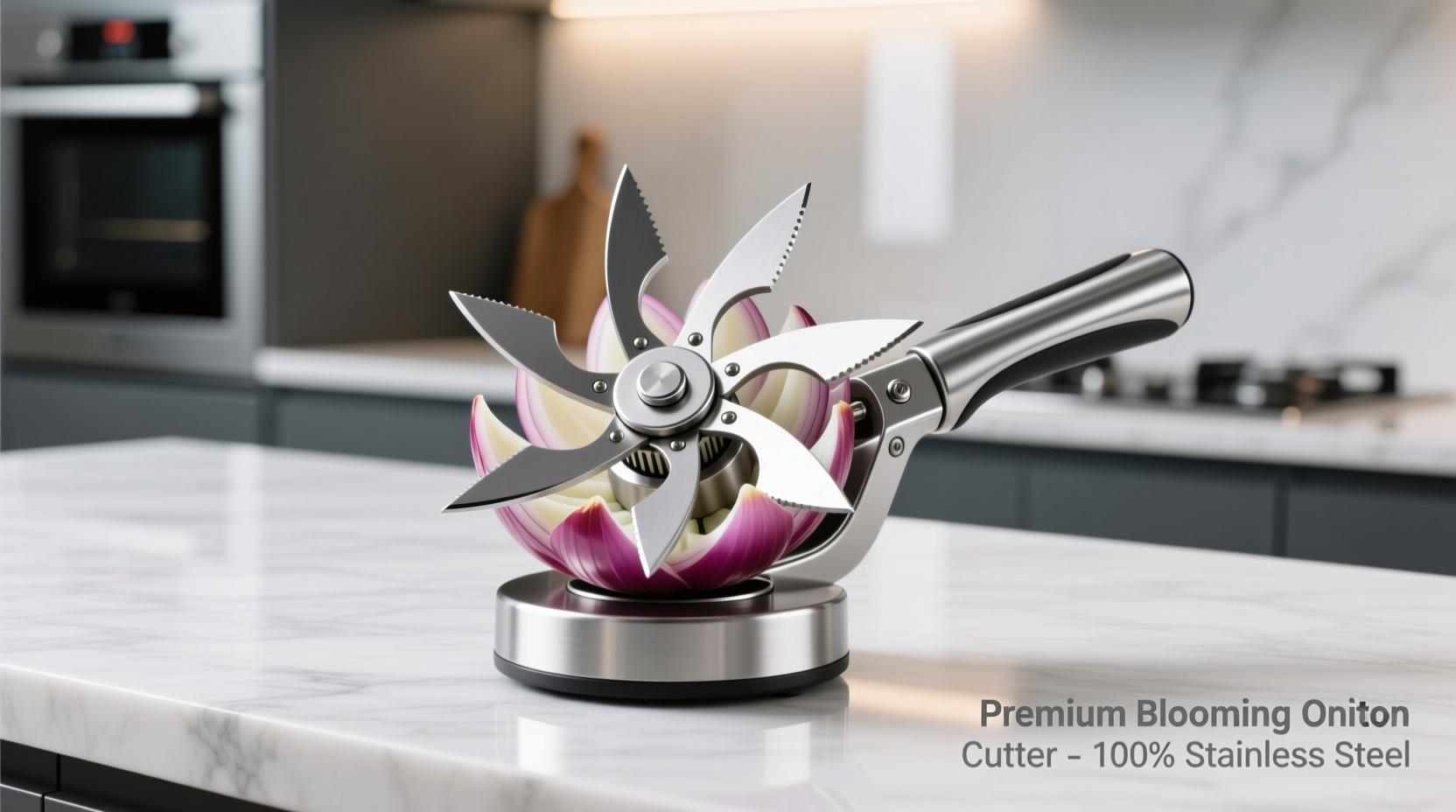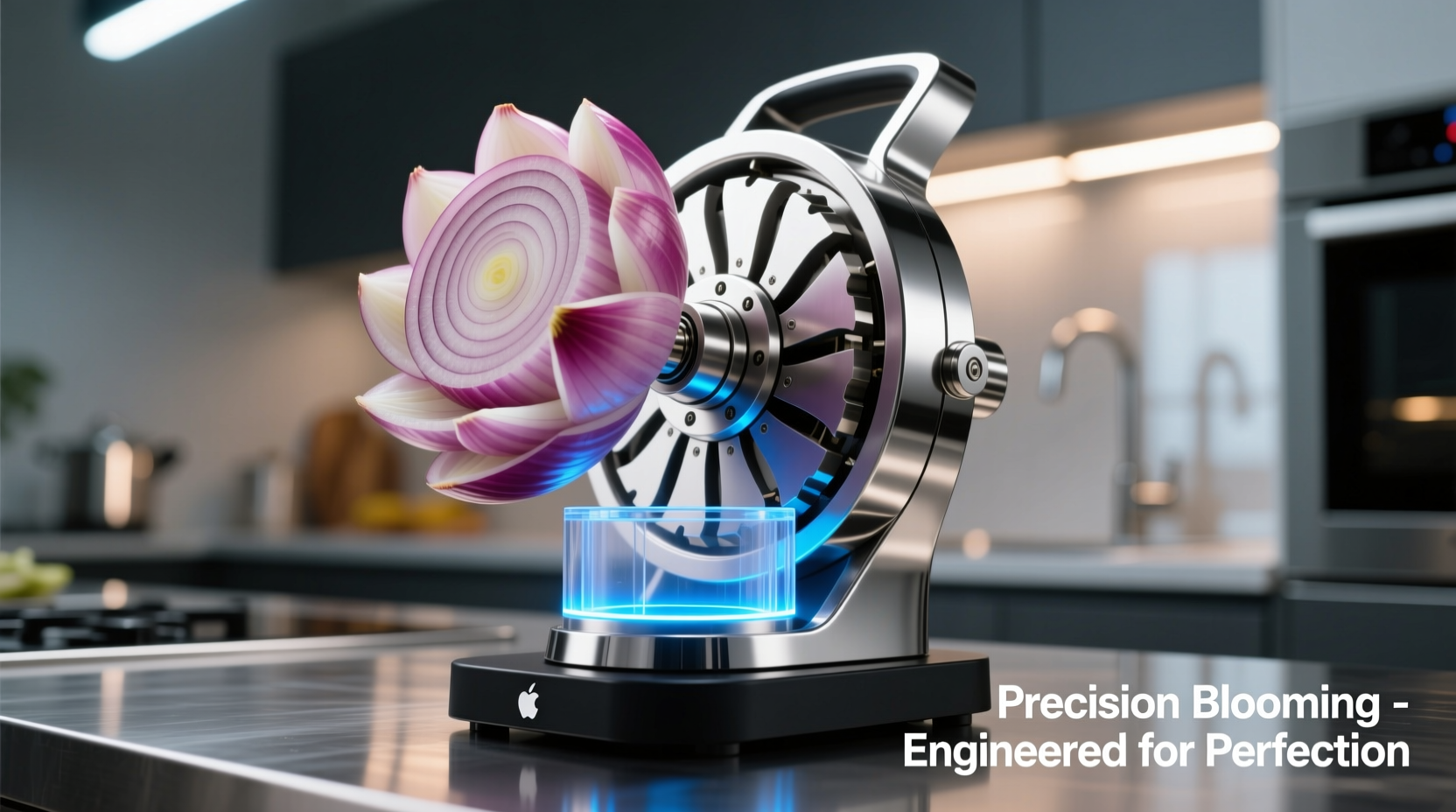Ever wonder how restaurants create those stunning flower-shaped onions that bloom when fried? The secret lies in a specialized kitchen tool that transforms ordinary onions into edible art. This guide reveals exactly how blooming onion cutters work, which types deliver professional results, and step-by-step techniques to master this culinary skill at home.
What Makes a Blooming Onion Cutter Different From Regular Knives
While skilled chefs can create blooming onions with a sharp knife, dedicated cutters solve three critical challenges:
- Precision consistency - Maintains uniform spacing between cuts for even "blooming"
- Safety - Secures the onion during cutting, reducing slip risks
- Time efficiency - Completes the radial cuts in one motion versus multiple careful knife strokes
Professional kitchen tests show cutters reduce preparation time by 65% compared to freehand knife work while producing more reliable results. The best models feature hardened stainless steel blades that maintain sharpness through hundreds of uses.
Evolution of Onion Cutting Technology
Blooming onion cutters evolved alongside the popularity of this restaurant signature dish:
| Time Period | Technology | Limitations |
|---|---|---|
| 1990s | Manual knife technique only | Required advanced knife skills, inconsistent results |
| Early 2000s | Basic plastic guides | Slipped frequently, couldn't handle large onions |
| Mid 2010s | Adjustable metal guides | Bulky designs, difficult to clean |
| Present | Ergonomic stainless steel cutters | Higher cost, requires proper storage |
When a Blooming Onion Cutter Is Essential (And When It's Not)
Not every kitchen needs this specialized tool. Understanding these context boundaries prevents unnecessary purchases:
- Worth investing in if: You regularly prepare appetizers for gatherings, run a food business, or want consistent restaurant-style presentation
- Unnecessary if: You only cook for one or two people occasionally, lack storage space, or primarily use onions in soups/sauces where presentation doesn't matter
- Better alternative: For occasional use, a sharp chef's knife with a guide template works adequately
Choosing Your Ideal Blooming Onion Cutter
Selecting the right model depends on your specific needs. Consider these factors before purchasing:
- Blade material - Professional-grade stainless steel maintains sharpness longer than cheaper alloys
- Adjustability - Models with depth settings accommodate different onion sizes (Vidalia vs. red onions)
- Ergonomics - Look for non-slip handles that won't fatigue during repeated use
- Cleaning method - Dishwasher-safe models save time but may dull faster than hand-wash versions

Mastering the Perfect Blooming Onion Technique
Follow these professional steps for flawless results every time:
- Chill onions for 30 minutes to reduce tearing and firm the layers
- Trim top 1/2 inch and remove outer skin completely
- Place onion root-down in cutter with blades positioned 1/4 inch from root
- Apply firm, even pressure while rotating the cutter through the onion
- Separate layers gently before soaking in ice water for 20 minutes
- Fry immediately or store in sealed container for up to 24 hours
Food science research from the Culinary Institute of America shows the ice water bath causes cellular expansion that creates the dramatic "blooming" effect when fried. Skipping this step results in less impressive presentation.
Safety Tips Every User Should Know
These specialized tools have sharp blades requiring proper handling:
- Always cut away from your body with fingers clear of blade path
- Use a stable cutting surface - never hold the onion in your hand
- Clean immediately after use to prevent onion residue from hardening
- Store in protective case or separate drawer to avoid accidental contact
- Keep away from children - the blades are significantly sharper than standard kitchen tools
Creative Uses Beyond Onion Blooms
Maximize your investment with these professional applications:
- Create decorative vegetable garnishes with mushrooms or tomatoes
- Prepare uniform slices for dehydrating herbs or fruits
- Cut consistent radial patterns in citrus for cocktail garnishes
- Make professional-looking layered dips with bell peppers
- Prepare even slices for spiralized vegetable noodles
Troubleshooting Common Problems
Fix these frequent issues with simple solutions:
- Onion doesn't bloom properly - Increase ice water soak time to 30 minutes
- Cuts too deep into root - Adjust blade depth setting for smaller onions
- Uneven spacing between cuts - Rotate cutter slowly with consistent pressure
- Blades become sticky - Rinse immediately after use before residue dries











 浙公网安备
33010002000092号
浙公网安备
33010002000092号 浙B2-20120091-4
浙B2-20120091-4